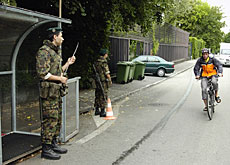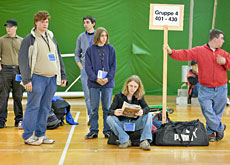Fewer soldiers to stand guard over embassies

The Swiss army plans to drop the number of its soldiers keeping watch over diplomatic representations if parliament accepts a new project.
Non-professional soldiers on regular refresher courses and recruits will no longer guard embassies and consulates after 2012, but the armed forces will provide more specialist troops for these duties and police will be increased.
The government’s aim is to reduce the number of soldiers used in support missions for the civilian authorities. The defence ministry has drawn up a new project based on past experience with the help of the cantons, who are responsible for most police duties.
The proposal calls for a maximum of 245 military security specialists to be on duty for diplomatic missions, compared with 1,090 today. Only 125 members of the armed forces would be used for embassy protection, whereas today that figure stands at 800.
The number of police keeping watch over foreign missions should increase at the same time, rising from 120 to 206 according to the cantons responsible for these security measures.
The army’s mission will not change though said Defence Minister Samuel Schmid on Monday. Military personnel will continue to support the civilian authorities on security issues, he added.
The armed forces will continue to play a secondary role according to the project, which answers criticism over the use of non-professional soldiers and recruits to guard embassies and consulates.
For the army, the quality of the specialists deployed in the future will compensate the lower number of soldiers on the ground.
Both Schmid and the vice-president of the cantonal police ministers’ conference, Karine Keller-Sutter, agreed that even if the current number of people guarding embassies is cut in half, security levels would be maintained.
In financial terms, the government expects to save around SFr8 million ($6.45 million) per year despite increasing the indemnities paid to the cantons for these security duties by up to 90 per cent, or another SFr12 million.
Welcome move
The project has been welcomed in most quarters.
The Swiss federation of police employees said that it had warned on a number of occasions that the population could end up considering the army and the police as a single security force.
Its president, Heinz Buttauer, said that the SFr12 million in extra funding for the cantons should be used to hire new personnel and provide extra training for embassy protection.
In the capital Bern, where the most foreign representations can be found, local police spokesman Franz Märki said embassy protection would be improved, adding that collaboration with army had been difficult until now because of soldiers’ different levels of training.
In Geneva, home of the United Nations’ European headquarters and a number of international organisations, the cantonal government refused to comment the project ahead of a meeting with the federal authorities later this week.
The Group for Switzerland without an Army, the country’s most vocal anti-military movement, said it was satisfied with the government proposal, but added that it still considered that the armed forces should not get involved in domestic security.
swissinfo with agencies

More
Militia army
The issue over whether the army should be used for security missions in Switzerland has been controversial and met with plenty of opposition. Most security duties are handled by the cantons.
The federal authorities’ security mandate is limited mainly to terrorism, money laundering and cybercrime, tasks usually handled by the federal police. There is no federal police corps with uniformed officers and talks to create one have never got off the ground.
The Swiss authorities have one group of uniformed security specialists, the border guards who come under the responsibility of the finance ministry.
Defence Minister Samuel Schmid has called in the past for the creation of a security ministry that would take over all security duties at the federal level, but he has never found the necessary support from his cabinet colleagues. Justice Minister Christoph Blocher has openly opposed the idea.

In compliance with the JTI standards
More: SWI swissinfo.ch certified by the Journalism Trust Initiative












You can find an overview of ongoing debates with our journalists here . Please join us!
If you want to start a conversation about a topic raised in this article or want to report factual errors, email us at english@swissinfo.ch.